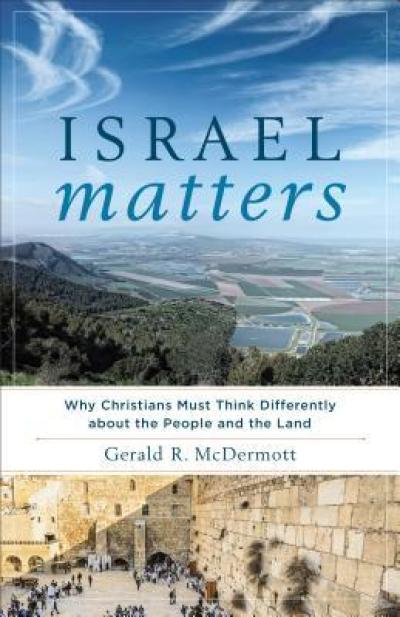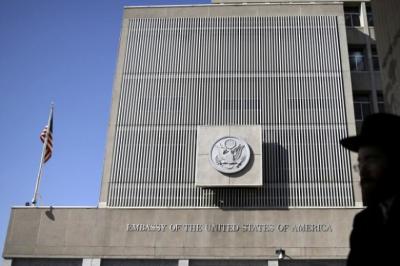Christians Must Think Differently About Israel, Jews in Light of Past Atrocities: Gerald McDermott

The majority of Christians have been wrong about Israel for most of their history, according to a leading Anglican theologian and Israel scholar.
For many reasons, Christians ought to think differently about the land of Israel and the Jews as God's covenant people, Gerald R. McDermott, Anglican chair at Beeson Divinity School in Birmingham, Alabama, explains in a new book.
In an interview with The Christian Post on Tuesday, McDermott explained that his latest work, Israel Matters: Why Christians Must Think Differently About the People and the Land, articulates why it's important for believers in Jesus to engage Israel with the utmost humility. This is necessary not only because of the geopolitical complexities present there but especially because "the Jews have been horribly wronged by Christians over the millennia."

"Even before the Holocaust, hundreds of thousands, perhaps millions, of Jews were murdered over the last 1,800 years by Christians as "Christ-killers," McDermott said, noting at the time of the Holocaust Germany was the most Christianized nation in the world.
"Jews know these things and are afraid of us," he said.
The error in thinking that Jesus departed from Judaism and began a new religion furthers the distance between Christians and Jews and makes Jews into an "other," he said.
Yet in the past several decades, especially in the United States, a resurgence of what is known as Christian Zionism, the view that the land of Israel and ethnic Jews remain central to God's eternal purposes, has occurred.
McDermott did not personally subscribe to this perspective because he associated it with dispensationalism, theology that considers biblical history as divided intentionally by God into specific ages to each of which He has allotted distinctive administrative principles. This teaching was popularized in the 1800s by Anglo-Irish preacher John Nelson Darby.
But all that began to change for him upon doing further study of the Bible and history and he found that throughout the ages a minority has believed that one day, in accordance with Scripture, a massive ingathering of Jewish people to their historic homeland would take place.

He realized he did not have to accept a dispensationalist approach to regard the land and people of Israel as an essential component of God's ongoing work in the world. Nor did he have to subscribe to the often wild, apocalyptic end times scenarios some Christian Zionists have espoused in the past.
In Chapter 3 of Israel Matters the author showcases "Those Who Got It Right."
From early Church fathers like Tertullian to more recent figures like American theologian Jonathan Edwards and Swiss theologian Karl Barth, each of these men believed that a day would come when the Jews would return to their ancient homeland.
During his ministry Edwards repeatedly warned against spiritualizing biblical promises to the Jews. When the modern state of Israel was established in 1948 Barth wrote that it was a "secular parable" and that the large numbers of Jews returning to the land was a fulfillment of biblical prophecy.
As is expressed throughout The New Christian Zionism, a volume of Christian scholarship on Israel released last year for which McDermott was the editor, Israel Matters argues strongly against supercessionism. This is also known as "replacement theology" which holds that the Church replaced Israel as God's chosen people.
Today, what is known as "fulfillment theology," which some assert is merely an updated form of replacement theology, also holds that Jews do not have a God-given destiny in their ancient land. But instead of the Church replacing Israel, its proponents contend that Jesus fulfills in his life and redemptive work all the promises that God ever made to the Jews, including the promise that the land of Canaan would be their everlasting possession.
This theology considers the land insignificant and that the only Jews who are now significant to God are Messianic Jews, those who believe Jesus is the Messiah.
But several passages in the New Testament suggest both beliefs are wrong, McDermott explained.
"Paul says in Romans 11:28 that the Jews who did not accept Jesus as Messiah were 'enemies of the Gospel' but nevertheless 'are beloved' to God, and that their 'gifts and calling of God' to be His special people 'are irrevocable,'" he said.
Moreover, the Apostle Paul was writing to the Romans 30 years after Jesus' resurrection but even then was still saying that God's covenant with ethnic Israel remains in place. This did not mean that all Jews were saved, but that they were still special to God in a particular way.
Likewise, in his Beatitude in Matthew 5:5, Jesus was quoting Psalm 37:11 word for word when he said, "Blessed are the meek, for they shall inherit the [earth.]" The Hebrew word for "earth," which is used five times in Psalm 37, in every one of these five instances in Psalm 37 refers to the land of Israel, McDermott continued. So the Beatitude is better translated, "Blessed are the meek, for they shall inherit the Land."
And in Acts 1:6, "when Jesus' disciples asked him just before his ascension, 'Lord, will you at this time restore the kingdom to Israel?' Jesus did not tell them they were wrong to think there would be a future Israel that God would establish," he said.
"Instead, He (Jesus) said that the timing of that future was not to be known then."

In addition to the theological objections McDermott unpacks in the book, he explores the modern political history of the region, which is often characterized by intense and bloody conflicts.
Yet unlike some Christian Zionists who appear to think that the nation of Israel can do no wrong, McDermott is not afraid to criticize the Israeli government when it's warranted.
He acknowledges in the book where Palestinians have been mistreated at times, how the Israeli government has broken promises, and how certain policies have been unwise. He also writes that the state of Israel should do more to protect Messianic believers. Whether an unjust action is perpetrated by a Jew or an Arab, he says, Christians need to feel free to raise their voices to criticize whoever is responsible when it is clear such an injustice has occurred.
Although imperfect, the state of Israel, "an oasis of freedom and democracy in the Middle East," is inextricably linked with the Jews, McDermott insists.
"Even if the covenanted people of Israel and the state of Israel are not one and the same, they are intertwined in a complex way," he writes in the book.
"The state could not exist without its people, and the covenanted people could not survive or flourish without the state. The state shelters the people, and the people — though not all are religious Jews — support the state. One without the other is unthinkable and impossible."
For Christians who care about the Palestinians and their rights, McDermott encourages them to visit Israel since tourism helps everyone there, and to support the largely-unreported incremental steps Israel is taking to improve the lot of Palestinians.

Written in a scholarly yet accessible tone, Israel Matters is likely to be a important resource for Christians looking to bring their faith to bear on current events unfolding in the United States and in the Middle East. Earlier this month President Donald Trump signed a waiver delaying the move of the U.S. Embassy to Jerusalem, skirting a key campaign promise that he might or might not revisit.
CP asked McDermott if moving the embassy would constitute a blessing to Israel, as some scholars have argued.
Such a move would "help the cause for peace, not hurt it," he replied.
"First of all, it would be the simple recognition of reality: Jerusalem and no other city is Israel's capital," McDermott said.
"Second, the Palestinian leaders are thugs who would realize by this move that they can no longer dictate as they did to Obama, whose policies hurt both Jews and Arabs."
The only hope for improvement is for Palestinian President Abbas to understand that he has to talk to the Israelis and moving the U.S. diplomatic outpost to the capital would signal to him that he can no longer circumvent the Israelis and try to get what he wants from the United Nations, he added.
Aside from the fulfillment of prophetic scriptures and political considerations, Christians need to think differently about the people and land of Israel because Jesus was and is Jewish, McDermott stressed. And in order to relate to Jewish friends, getting in touch with His Jewishness is essential.
"The Jews were raised up by God as representatives of humanity," McDermott said. "So that if the Bible shows their departures from God, it is really illustrating ours."
"Jesus prized Jewish law, said that salvation is from the Jews, predicted that one day Jerusalem will welcome Him, and foresaw that His Apostles will one day rule over the tribes of Israel," McDermott said.
If Christians begin to think they are somehow better because they believe in Jesus as Messiah and the Jews do not, they fail to understand God's grace, he added.
"When we realize how profoundly Jewish Jesus was and is, we will feel greater kinship with those for whom Paul said he had 'unceasing anguish in his heart.'"





























